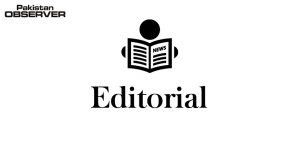DESPITE repeated calls by saner elements to spare institutions, there is no letup in the tendency to openly drag the national institutions in political debates, which will have serious repercussions for much-needed national unity and harmony.
Addressing a public meeting on Sunday, PPP Chairman Bilawal Bhutto Zardari accused Prime Minister Imran Khan of turning Pakistan Army and ISI into his Tiger Force and a day earlier in a similar event leader of PML (N) Maryam Nawaz alleged that the PM has launched a suicide attack on defence forces.
Responding, Interior Minister Sheikh Rashid Ahmad criticized the Opposition for discussing and defaming the forces in public meetings, threatening she (Opposition) would be treated the way clothes are laundered at traditional clothe washing sites (dhobi ghat).
The latest phase of acrimonious debate on the role of the defence forces and ISI was triggered by recent postings and transfers in Pakistan Army, which should have been treated as a matter of routine and differences, if any, should have been sorted out in a discreet manner.
The issue became controversial because of public statements of some leaders of the ruling party and the opposition and then used it as a golden opportunity to lash out at the Government.
All this is unfortunate and might be demoralizing for the defence forces that are rendering great sacrifices for the security and defence of the country in the backdrop of visible and invisible challenges both on internal and external fronts.
The recent geo-strategic developments and emerging situation in the region demands a peaceful environment and unity at home to lend necessary strength to the defence forces to fulfil their responsibilities of safeguarding the interests of the country effectively.
It is an irony that almost all national institutions have become subject of intensive debate and criticism because of various reasons and vested interests and those who are making them controversial easily forget that they are harming and weakening the country in the process.
Judiciary remains the focus of criticism because of its politically-oriented judgements and some judges are targeted unfairly for strictly adhering to the highest standards of fairness and justice.
Both the Government and the Opposition criticize the judiciary or shower praises on it based on the suitability of various judgements to their political agendas.
The National Accountability Bureau (NAB) bears the brunt of criticism because of the nature of its role and responsibility as a watchdog against corruption.
There is national consensus that the menace of corruption is assuming dangerous dimensions and it has to be checked with iron hand if the country is genuinely interested to make progress.
However, the Opposition has all along been accusing NAB of lop-sided accountability and serving as a tool in the hands of the Government and strangely enough now the Government wants to take away the same powers from the institutions that were used in the past against the Opposition, perhaps, fearing these might be one day used against members of the ruling party accused of corruption.
The issue of appointment of a new Chairman is also being mishandled and this would also have serious repercussions for the overall image and reputation of the institution and the process of accountability.
The Election Commission has the onerous responsibility of ensuring free, fair and transparent elections and instead of appreciating its efforts in this regard and respecting its views on critical issues affecting the overall credibility of the electoral exercise, the CEC and the institution itself are being targeted for ulterior motives.
As for Parliament, it does not enjoy the status that the Constitution envisages for this ‘supreme’ institution mainly because of lack of interest both on the part of the Government and the Opposition.
There is a general impression that the forum of Parliament has been rendered irrelevant as far as important policy issues and decisions are concerned, legislation (which is one of the core responsibilities of Parliament) is being done through ordinances and lack of quorum for weeks is reflective of the level of importance that the elected representatives give to a platform that should serve as fountainhead of power.
Apart from the institutions that have stakes in the system, scores of other institutions like PIA, Pakistan Steel, Pakistan Railways, Pakistan Post, Radio Pakistan, PTV and Utility Stores Corporation are also sinking due to short sighted vision.
The situation is unlikely to change until and unless both the Government in power and the Government-in-waiting shift their focus from power politics to institution building and resolution of problems of the people, for which they are mandated by the people in the elections.










